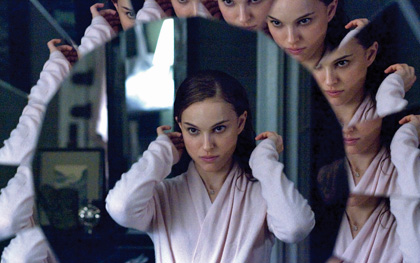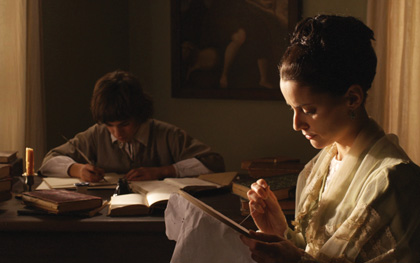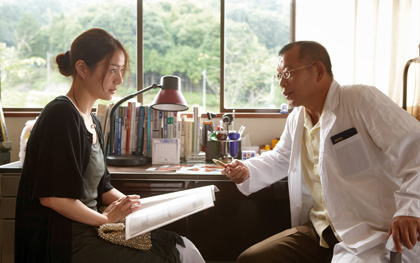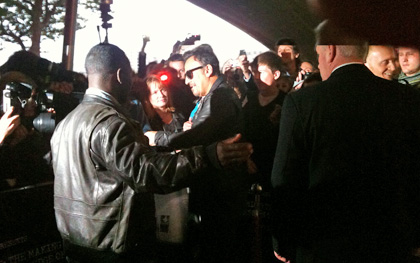Festivals
London Film Festival 2010: The S&S blog
Week 2: Black Swan, Mysteries of Lisbon, Dear Doctor – and The Boss

Nick James, 1 November
In the first week of the LFF, we at S&S were putting the December cover date issue to bed. So it was only in the second week that I got into the festival groove. What follows are my impressions of that dizzying week (Friday 22-Friday 29 October) of films and other fun.
I was at the Jameson gala on the 22nd for Darren Aronofsky’s Black Swan (pictured above). I’d already seen it just days beforehand at a press screening and wanted to see again in preparation for an interview with Aronofsky. A second viewing of this deliberately claustrophobic ballet tragedy makes one more aware of the amount of CGI face-switching that goes on between Natalie Portman’s uptight lead dancer Nina, Mila Kuni’s earthy rival dancer Lilly and Winona Ryder’s washed-up dancer Beth. All this doppelganging reflects what’s going on inside Nina’s overspilling paranoid imagination. Considering all his works so far, it’s clear that Aronofsky likes his meanings to overspill – he doesn’t want too much doubt or calculation clouding our minds.
This particular audience seemed over-awed by the time the director, plus actors Kuni and Vincent Cassel, returned for a Q&A. A dancer from the Royal Ballet in the audience confirmed that ballet life really can be as hyper-melodramatic and stereotypically fraught with neurosis as the film portrays. The following day I interviewed Aronofsky at a Knightsbridge hotel. He’d been up most of the night dancing with British friends in a club, something he said he almost never does, and I don’t suppose he was throwing ballet shapes or searching for his double. However, he did look as pale as Portman in face powder.
Hong Sangsoo’s latest, Oki’s Movie, pretends to be a portmanteau of four short films by three characters caught in a love triangle. At the apex is Oki, a female filmmaking student, who wins the attention of a male student and an older teacher. Funny and warm as all Hong’s films are, their charm seems to be thinning with each new entry. Structurally and in terms of situation comedy, they’re always interesting, but one can spend time with more engaging people than these tentative, half-hearted, half-drunk romantics.

If I much preferred Raul Ruiz’s 270-minute Mysteries of Lisbon (above), it’s partly because I feel bewitched by a certain variety of Portugese cinema whose charms are hard to describe. I saw Mysteries in two parts with several days between them, the first at a press screening, the second at the Festival’s Cine Lumiere presentation. At the latter, producer Paolo Branco told us about Ruiz’s ability to get complex tracking shots right first time with a young cinematographer (André Szankowski) he’d never previously worked with.
Ruiz has made a huge variety of films, but the work that Mysteries most resembles is his elegant Proust adaptation Time Regained. Adapted from a Gothic influenced novel by Camilo Castello Branco (no relation) concering the progeniture an orphan boy called João, it’s a breathless narrative of passion, jealousy and intrigue that constantly revises itself as it unfolds and offers new versions of what we think we know, so that very little can be taken for granted. It combines a brilliant non-plussing formality of approach to drama with gorgeous Carravaggio-inspired lighting. I can’t wait to see it again, though I’m aware that its gas-and-air mix of formal games and inescapable melancholy won’t appeal to everyone.
Much less engaging was the film that followed Mysteries at the Ciné Lumiere, Memory Lane. A charmed circle of young friends from the south-west suburbs of Paris spend one summer hanging out while wrapped up in series of overlapping emotional dilemmas. All this is recalled by a handsome pivotal young manwho sings in a band with some of the friends. The director, Mikhäel Hers, gives us a strong and moody sense of place, but his cute-looking characters evince a namby-pamby preciousness that’s amplified by the band’s truly sappy songs. Hers himself proved an ultra-shy presence during the Q&A, but fortunately actress Dounia Sichov – on this evidence a better performer than Thibault Vinçon in the lead role – was on hand to help to explain Hers’ Rohmeresque methods.
Monday lifted off with a searching, ruminative interview with Cristi Puiu, the director of Aurora, a three-hour character study of a man who decides to commit murder. Puiu was very clear about the reasons why he decided to play the character himself (you’ll have to wait for the relevant issue of the magazine to find out what they are). But it has become a strange sub-phenomenon of contemplative festival-friendly cinema that non-acting directors like Puiu, Ceylan and Mundruzsco have felt that they had to be the lead figure in one of their own films.
The elation I felt from the interview left me as soon as I started watching Sergei Loznitsa’s My Joy. This properly weird road movie about a truck driver whose life is completely distorted by his experiences in the backwaters of Russia was inventive and darkly funny in places, but its preference for allegory over people made it feel too inert. In this version of Russia, pain is arbitrarily dished out to all, but the film lacks any moral justification for its own nihilistic disinterest.

For a backwater portrait I preferred the modest Japanese film Dear Doctor (above), directed by Miwa Nishikawa. It starts with the sudden disappearance of Ito, the doctor of a small rural community, but then flashes back to a situation that would do for Peak Practice: Soma, a flashy young sports-car-driving graduate doctor, arrives at the country medical centre where Ito does things as much by intuition as by medication. However broadly comedic its intentions might at first seem, Dear Doctor turns out to be a rich character study with an immensely subtle insight into the meaning of the bedside manner.
The first half-hour of the Vietnamese film Don’t Be Afraid, Bi! threatened to be a cutesy child’s-eye-view of such family miseries as a father who never comes home until he’s drunk, a deeply frustrated mother, and a doting schoolteacher aunt who has a crush on one of her teenage pupils. But once the boy’s grandfather turns up to die, slowly, amongst them, the film’s loose structure of heat-induced high tension and vivid passionate encounters becomes increasingly explicit and compelling. First-time director Phang Dang Di deserved the film’s mention as a runner-up for the festival’s Sutherland Award.
The BFI LFF Awards are a newish proposition, only in their second year. One might think that there’s a surfeit of such events, but what distinguished this occasion were the clusters of real directing talent in the room and the collegiate atmosphere – there was none of that competitive rancour that sometimes disfigures the British Independent Film Awards. It was great, for instance, to take in the rare sight of three British women directors in a huddle – Antonia Bird, Joanna Hogg and Clio Barnard. To my delight, the latter’s The Arbor won two awards (Best Newcomer and the Sutherland Prize), and I was also pleased for Alexei Popogrebski, able to pick up his Best Film award for his splendid Arctic isolation drama How I Ended the Summer in person after failing to get a visa to attend his prior festival screenings. The cake’s icing was brief cameo from Martin Scorsese in which he praised the work of the BFI National Archive.
On closing night, Thursday 28, I skipped Danny Boyle’s 127 Hours, which I’d seen a week beforehand, and went straight to the party. The film, about Aron Ralston, the climber who got his arm pinned by a rock after a crevasse fall, is Friday-night adrenaline-shock entertainment, with a winning performance from James Franco. Primarily it’s a technical tour de force in how to make a fuzzily engaging film about a man who can’t move. The initial crush at the party also encouraged stillness, but everyone seemed to be in a pleasant end-of-term mood, with many espousing optimism despite the bleak financial prospects for the arts. It was a good way to end.

But after all that, it was bizarre indeed to be at BFI Southbank the very next day (Friday 29) to find its riverfront mobbed by rock-music fans. The occasion was a preview screening of The Promise, a documentary about the making of Bruce Springsteen’s 1978 album Darkness on the Edge of Town, and the coup was that ‘The Boss’ himself was in attendance for a Q&A. I’m old enough to remember when that album came out and the powerful impact it had on what was then the post-punk, New Wave rock scene.
The documentary was fascinating for fans, but must have been a little obtuse for those who are unfamiliar with Darkness, a melancholic album of blue-collar angst. Only brief fragments of the songs were played – snatches caught by a camera-wielding friend of the band at the time. What most fascinated was the way Springsteen was working: he and the E Street Band recorded around 70 songs, and arrangements kept shifting while the more melodic songs (for instance, Fire and Because the Night, both of which became hits for other artists) were rejected in favour of austere, riff-driven anthems (the shock of punk still feeling fresh in America at that moment). Springsteen, 27 years old, was working out of a huge book of ideas and lyrics and trying to retain total control over something he could hear in his head but didn’t know how to manifest in a recording.
Springsteen attended the after-party but was besieged throughout by fans wanting mementos. I met his manager, Jon Landau, who’d once been a movie critic for Rolling Stone. He told me almost proudly that he was the only critic dumb enough to have panned The Godfather on its release. Now that’s my kind of festival finale.
« Two very different sports documentaries
See also
London Film Festival 2010: 30 recommendations (online, October 2010)
Pi reviewed by Mark Sinker (January 1999)
The Fountain reviewed by Michael Atkinson (March 2007)
Mumbai rising: Danny Boyle tells Alkarim Jivani about filming Slumdog Millionaire (February 2009)
The Beach reviewed by Xan Brooks (March 2000)
Mexico rising: Raúl Ruiz interviewed by Nick James (January 2006)
